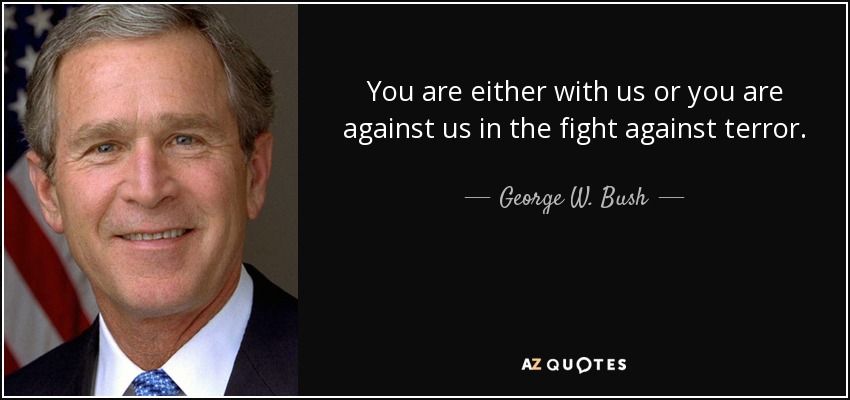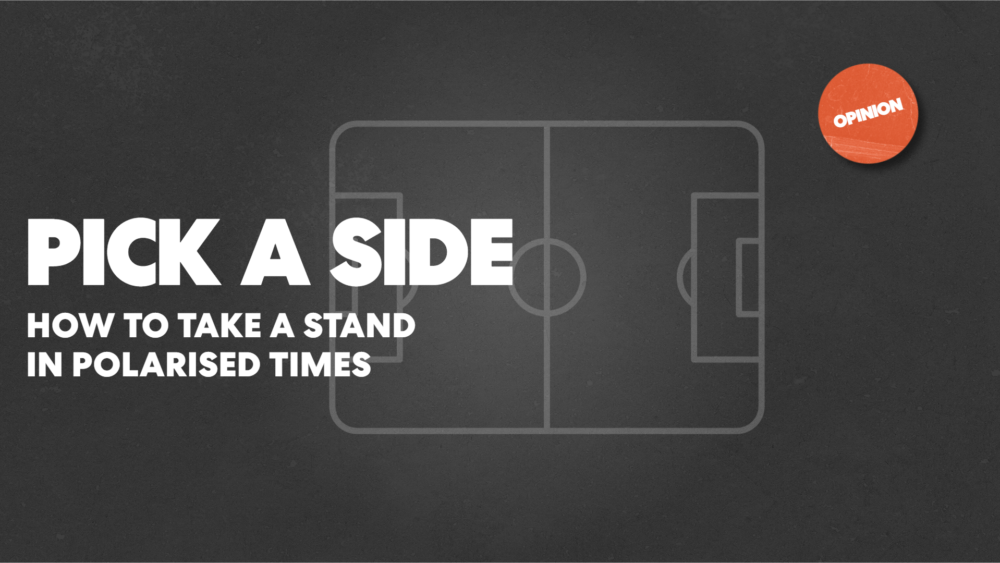Damned if you do, damned if you don’t. Mehran Khalili discusses the almost impossible task of pleasing everyone in the midst of major global talking points.
Soon after Russia invaded Ukraine, DiEM25 published its position on the conflict. The sub-headline was: ‘Stop Putin’s invasion. Stop NATO escalation. Peace via a people’s diplomacy!’
On the surface, this was an uncontroversial view: end the damn war, work for peace. I’m an adviser to DiEM25, and it made sense to me.
The reaction to the statement, though, was surprising. Many people felt it stopped short of a full-on condemnation of Vladimir Putin’s actions. And they were upset. Some members and partners even quit the movement in disgust.
A few days later I hosted a debate on Ukraine, with DiEM25. We heard from a Ukraine expert, activists from Moscow and Kyiv, and a panel of commentators.
The debate was valuable, and I learned a lot. But though it was generally well received, a chunk of the reaction went the other way. Why weren’t we blaming the West, commenters asked, focusing our ire on NATO’s expansion policy that led us to this war?
OK, we can’t persuade – or please – everyone. And maybe I shouldn’t have dipped into the comments in these instances. But the reactions also showed something that’s worth looking closer at.
Whose team are you on?
Humans have an inherent need to pick a side in any dispute. And this is particularly true in times of war.
When conflict explodes, our first thoughts should of course be with the victims. As of writing, 19 children have been killed in Ukraine, among hundreds of civilians.
But for the rest of us, who are fortunate – for now – to be bystanders, our world is thrown into uncertainty. Unlike wars past, today we witness the effects of organised killing in action, brought to us in real-time and unfiltered via smartphones and social media. We grope for an understanding. And a key part of this is choosing who is wrong and right.
Our biases running wild
Yet quickly, our biases come into play. I’ll use myself as an example.
Like many others, I wasn’t following the situation in Ukraine closely until last week, when the invasion escalated everything. Friends and family asked me what was going on, and whose fault all this was. And I came up short.
War is a catastrophe. Putin was the aggressor here, brutalising and murdering the people of Ukraine. He must be condemned without reservation. And the West’s slow advance towards encircling Russia, via NATO, was a provocative act. It was a complicated, tragic mess.
So I sifted through news sources, reading as widely as I could. And while doing so, I noticed something interesting: I was looking for stories that blamed US imperialism.
Why? Our personal experience plays a greater role here than we’d like to think. The first global event that really politicised me was the Iraq war in 2003. Since then, I’ve followed US politics and foreign policy closely – and I didn’t like what I learned. And I’m half-Iranian, so I’m familiar with the effects of US intervention and how it can screw a country over.
With only basic knowledge of the facts on Ukraine, I instinctively wanted to join the tribe against US foreign policy. It was my confirmation bias in action.
Many Western observers, also scrambling for answers on the conflict after the first bombs dropped, must have come at the problem from the other direction. English-speaking legacy media, driven by the US, have been positioning Russia as the antagonist since forever.
But when Trump emerged, starting with the claim that Russia hacked the US election, this kind of coverage shifted into overdrive. It created the narrative Russia = bad, and Putin = strongman dictator (while casting the US/Biden in the opposite roles).
And when that strongman invades, thanks to confirmation bias, people imbued with this narrative are going to seek to confirm it.
It depends on when we start the clock
This video by Russell Brand provides a useful model to approach the debate on Ukraine.
Brand weighs up two articles. One adopting the view that Putin is Hitler; the other condemning him for the invasion but looking at the West’s role in the conflict in recent decades. (These views are roughly the two poles of accepted Western discourse.)
Brand cites Phyllis Bennis, who writes on Ukraine:
Resolving the conflict [..] requires understanding its causes — which has everything to do with when we start the clock.
If we start the clock in February 2022, the main problem is Russia’s attack on Ukraine. If we start the clock in 1997, however, the main problem is Washington pushing NATO [..] to expand east, breaking an assurance the U.S. made to Russia after the Cold War.
What a fantastic framing for figuring out how to apportion blame, who to support. When do you start the clock? Since violence begets violence, and illiberalism begets illiberalism… who struck out first?
We could apply this framing to any geopolitical conflict, past or present. Think Israel/Palestine, Northern Ireland, Cyprus or Taiwan.
Or take our current culture wars. Should we start the clock when the historic injustices began against a given marginalised group? Or when members of that group rose up and over-corrected, demanding, say, censorship of views they disliked?
Nuance doesn’t persuade
But the world is complex. And despite being a human need, picking a side feels like a lazy and unsatisfying way of looking at modern conflict. Why can’t we keep two thoughts in our heads at the same time, and say the blame for today’s war in Ukraine is shared between Putin and the foundation laid by US foreign policy?
In a vacuum, this makes perfect sense. And it’s what DiEM25 was trying to do with its position on Ukraine. But the nuanced take doesn’t play well with mainstream audiences today.
Sixty percent of the world’s population is on social media, spending an average of two-and-a-half hours a day. This is an ADHD-world, replete with quick takes, fed by news in the form of headlines, thumbnails, snippets, from a collapsing industry desperate for clicks. Nuance? Ain’t nobody got time for that.
In this environment, simple, bold statements, delivered with authenticity, get the most play and engagement. Especially when war breaks out, and people are feeling angry, confused, insecure.
Stop trying to explain shit, they say. People are dying here. All that’s appropriate is solidarity with the victims, and vitriol for those who dropped the bombs.
And at that moment, it’s understandable.

George W. Bush drew stark lines after September 11.
A framework for getting through it all
How can we navigate this landscape, when our goal is to persuade? How can we confront power and tell the full story, without doing its dirty work and amplifying its message?
There’s no easy answer. But here’s where I’m at so far: a framework you can use, whenever conflict arises, to think clearly and communicate effectively.
(Remember we need to focus on what we can influence. So the below assumes that your activist project involves working on that conflict.)
Use probabilistic thinking
Don’t deal in absolutes. Do your reading, figure out where you stand and assign probabilities to your beliefs. For example, you might think Putin is 75 percent to blame for this war, and the West 25 percent. Or the other way around. And as above, be aware of when you’re starting the clock.
It might sound odd to you. But this is a more natural reflection of how people actually think, made explicit. And it will help you keep track of how your beliefs evolve.
Because you should also…
Update your priors
Change those probabilities based on observed evidence. NYT explains:
In stats lingo, “priors” are your prior knowledge and beliefs, inevitably fuzzy and uncertain, before seeing evidence. Evidence prompts an updating; and then more evidence prompts further updating, so forth and so on. This iterative process hones greater certainty and generates a coherent accumulation of knowledge.
See systems, not people
When I wrote about what we could learn from online public shaming, I concluded that personifying your target is a good strategy.
It’s easier for people to get mad at another person than at an organisation, or a system, or an idea.
All the spittle-laden op-eds about how Putin is a demonic megalomaniac who is hell-bent on restoring Russia to its former glory are following this model.
But here you’re trying to assess a conflict, to deconstruct it and understand how you could influence it. Rather than persuade others of your view on it.
So do the reverse. Look less at the aggressor’s character and their public statements, and instead analyse the system, the machinery, that keeps them in power. In Putin’s case that means: the oligarchic class he serves, the economics and culture of Russia today, and how political decisions are taken. As well as Putin’s rise to power (largely supported by the West).
Choose your battles
In your statements, consider the audience and the goal of the exchange. If you want to persuade, do all you can to avoid triggering an emotional reaction in your audience that will cause them to oppose you from the outset.
Timing is everything. In the immediate aftermath of war breaking out, or a racist attack, or any other moment when the pain is still raw, there’s only one thing to do. Denounce the aggressor and support the victims.
There will be a time and place for your nuanced, systems-based, constructive take. But choose them wisely if you want people to listen.
Do you want to be informed of DiEM25's actions? Sign up here















